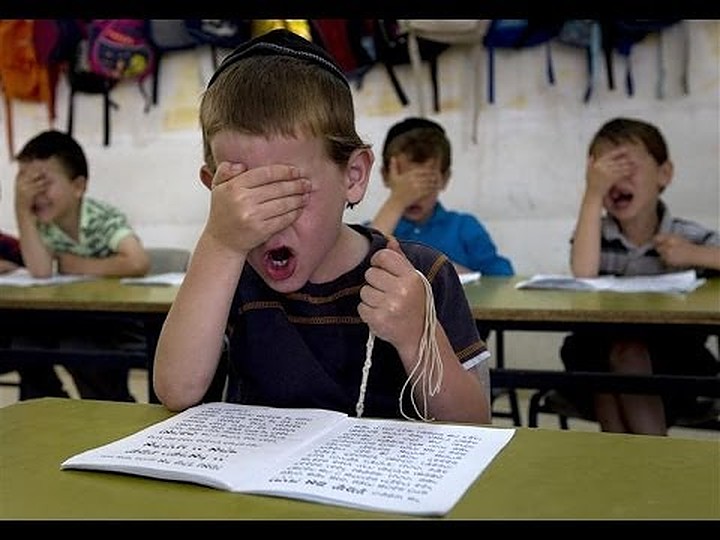The words of the ‘Shema’ are the last words of a Jew’s life and the last words of a Jew’s day. Even children recite the Shema before going to sleep at night.
By Rabbi Ari Enkin, Rabbinic Director, United with Israel
In the Torah portion of “Eikev” (Deuteronomy 7:12–11:25), we encounter the second passage of the famous Shema prayer. The Shema is the sacred declaration of our belief in the One God. The Talmud tells us that reciting the Shema connects us to God and declares our desire to serve Him.
In this article we are going to take a look at the Shema and learn more about it.
The Shema prayer consists of three different passages. The first passage, the most famous one that includes the verse “Hear, O Israel: the LORD our God, the LORD is one” is from Deuteronomy 6:4–9, which we encountered in last week’s Torah portion.
Due to the importance of proper concentration when reciting the opening passage, it is customary to cover one’s eyes with one’s right hand while reciting it. This helps eliminate distractions and better concentrate on the meaning of the words.
The final word of the verse, One/echad, should be prolonged and emphasized. This passage deals with accepting God’s law, to love God, and a commandment to the study the Torah and teach it to our children. It also mentions the mitzvah of tefillin (phylacteries) and mezuzah.
The second passage, found in the Torah portion Eikev (Deuteronomy 11:13–21), discusses reward and punishment. It, too mentions the mitzvah of tefillin and mezuzah, which should show us important these commandments are. (The mitzvah of tefillin is repeated a total of four times in the Torah!)
The third passage comes from Numbers 15:37–41, and it mentions the mitzvah of the tzitzit strings, and as such, one is to hold the strings in one’s left hand while reciting the Shema, or at least while reciting this paragraph. The strings are also customarily kissed every time they are mentioned and at one or two other points in the prayer. Even more important in the third passage of the Shema is the commandment to never forget the Exodus from Egypt.
The Shema is recited, in some form, 3-5 times a day, which, by extension, means over 30 times per week. It is probably the most recited prayer in our liturgy. It is the centerpiece of every morning service and evening service. It may very well the most important prayer, in fact, considering that only the Shema and the Grace after Meals are explicitly mentioned in the Torah. All other prayers are of a lower-level importance.
In addition to the recitation of the Shema in the order of prayers, it has also been used as the prayer recited before dying, whether a natural death or, more infamously, by Jews as they were burned at the stake or slaughtered in pogroms. It is the last words of a Jew’s life, and it is also the last words of a Jew’s day. Even children recite the Shema before going to sleep at night.
The Shema is also said to allude to the Ten Commandments. For example, the first Commandment, “I am the Lord Your God, who took you out of Egypt…” corresponds to the very first verse of the Shema, “Hear O Israel, the Lord is our G-d, the One and Only!” The 3rd commandment, “Do not take God’s name in vain,” corresponds to “You shall love the Lord your God…” and the 4th commandment – “Remember the Shabbat and keep it holy” – corresponds to the verse “Speak and live these words…when you sit in your house.” (The words “When you sit” in Hebrew can also be read as “The Shabbat.”) Shabbat is the day of resting at home and in the community. And so on.
The Shema is comprised of 245 words. There is a tradition, however, to ensure that the reading of the Shema totals 248 words, the number of limbs in a person’s body. In order to accomplish this, the one leading the services repeats the last three words of the Shema, “Hashem Elokeichem Emet” out loud for everyone to hear, thereby bringing the total number of words to 248. One praying alone generally says the three words “El Melech Ne’eman” BEFORE reciting the Shema in order to get to the 248 count.
For more insights by Rabbi Enkin on this week’s Torah portion, click on the links below.
https://unitedwithisrael.org/living-torah-to-bring-blessings-into-your-life-recite-blessings/
https://unitedwithisrael.org/living-torah-how-the-land-of-israel-stirs-the-body-and-soul/
https://unitedwithisrael.org/living-torah-dont-just-count-your-blessings-say-them/
Do You Love Israel? Make a Donation - Show Your Support!
Donate to vital charities that help protect Israeli citizens and inspire millions around the world to support Israel too!
Now more than ever, Israel needs your help to fight and win the war -- including on the battlefield of public opinion.
Antisemitism, anti-Israel bias and boycotts are out of control. Israel's enemies are inciting terror and violence against innocent Israelis and Jews around the world. Help us fight back!
